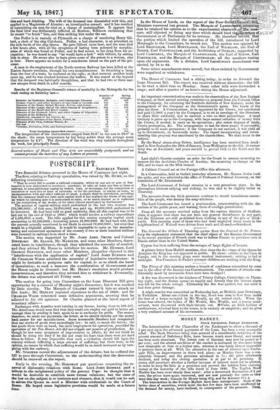POSTSCRIPT.
SATURDAY NIGHT.
Two financial debates occurred in the House of Commons last night. The first, relating to Railway speculation, was raised by Mr. HUME, on the
following resolution-
" 'That in every bill to enable a railroad company, which by any act or acts of PAT. Bement is now authorized to construct, purchase, or take on lease any line or lines of railroad, to raise additional capital by shares, loan, or mortgage, for the completion or extension of such line or lines of railroads, or for the purchase or taking on lease, or amalgamation with any other railroad or canal, a clause shall be introduced, providing that the company shall not raise such capital until It has realized the whole of the capi- tal which by existing acts it is authorized to raise, or Bo much thereof as is sufficient for the completion of the works, or for other objects sanctioned by Parliament."
The amount of capital railway stock authorized in the last two sessions was 124,586,0001.: of that sum, 28,000,0001. was paid up, 40,000,0001. authorized to be borrowed. He had been told on good authority, that all this capital was to be laid out by the end of 1849 or 1850; which would involve a railway expenditure of 1,500,0001. a week. The bills applied for this session comprise capital stock amounting to 82,500,0001; borrowing power, 41,000,0001 He had been told, that the amount actually sanctioned is not hkely to exceed 70,000,0001.; but even that would be a frightful addition. It would be impossible to carry on the manufaa- toting and commercial operations of the country if two or three hundred millions were invested in railways in so short a time.
The motion was supported by Mr. Jowa ABEL SMITIL and Colonel SIBTHORP. Mr. ELLICE, Mr. MANGLES, and some other Members, depre- caMd haste in interference, though they admitted the necessity of control; and they advised Mr. Hume to withdraw his motion. Mr. HUDSON, Lord GEORGE BENTINCK and some other Members, altogether objected to this "interference with the application of capital." Lord Joine RUSSELL and Sir CHARLES WOOD admitted the necessity of legislative interference: it might be desirable to postpone calls for capital, so as to check the haste of speculation; to such a measure the consideration of Government and the House might be directed: but Mr. Hume's resolution would produce inconvenience, and therefore they advised him to withdraw it. Eventually, the debate was adjourned till Friday next.
The motion for going into Committee on the Loan Discount Bill gave opportunity for a renewal of Monday night's discussion; lint it was marked by little novelty. The Marquis of GRANBY turned it into an attack on free trade; Mr. HENLEY repeated objections to the act of 1844; and Sir CHARLES WOOD reiterated some defensive arguments, avowing that he adhered to his old opinions. Fir Charles glanced at the latest aspect of monetary affairs— Exchanges with America were turning in our favour, having risen to 106-107. The Americans would soon find that they could not employ oar gold to better ad- vantage than by sending it back again to us in exchange for goods. The sooner, therefore, we made our payments, the better, as we should thereby get the money back sooner for our manufactures. Some honourable Members had complained that our stocks of goods were exceedingly low: he said, so mach the better; the less goods there were on hand, the more employment for operatives, provided the operation of the Ten Hours Act did not cripple our powers of pr . Al- though he saw some symptoms of improvement in affairs, he did not think he should be doing his duty if he did not state his fears that there were yet hard times to follow. It was impossible that such a visitation should fall upon the country without inflicting a large amount of suffering; but there were,' in his opinion, no means by which that suffering would be so much increased as by tam- pering with the currency. Mr. SPOONER moved the adjournment of the debate; but he suffered the bill to pass through Committee, on the understanding that the discussion should be renewed on the report.
Early in the evening Mr. HORS3SkN put questions respecting the re- newal of diplomatic relations with Rome. Lord Joss RUSSELL paid a tribute to the enlightened policy of the present Pope: he thought that it would be desirable to establish more formal relations; but the state of the law on the subject is so intricate and obscure, that it would not be safe to advise the Queen to send a Minister with credentials to the Court of Rome. He hoped some legislative provision would be made at a future time.
In the House of Lords, on the report of the Poor-RehIr.ylited) Bill, Si) Ministers recovered lost ground. The Marquis of LiNSDI ndinittiog that he retained his opinion as to the experimental charade --/ sure, still objected to fixing any time which should bind
'1408
Government or of Parliament for its revision. He therefore me:Ad, that
the portion which limited the operation of the bill, introduced by Lora Monteagle in the Committee, be struck but. This motion was opposed by Lord Bnotionax, Lord MONTEAGLE, the Earl of Weageow, the Earl of RODEN, Earl FITZWILLIAM, and the Archbishop of DUBLIN; supported by Lord CAMPBELL, the Marquis of CLANRICARDE, the Earl of RIPON, Earl FORTESCUE, and the Marquis of CONYNGRAX; all the speakers resting upon old arguments. On a division, Lord Lansdowne's amendment was carried, by 54 to 42.
Some minor amendments were moved; but those resisted by Government were negatived or withdrawn.
The House of Commons had a sitting today, in order to forward the Loan Discount Bill. The report was received without discussion; the bill to be read a third time on Monday. Some other bills were forwarded a stage; and after a quarter of an hour's sitting the House adjourned.


























 Previous page
Previous page